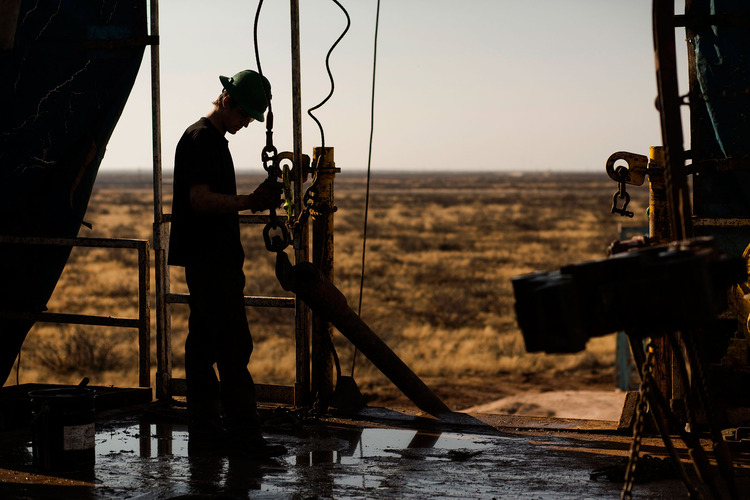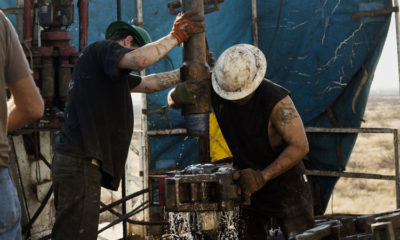Economy
Rising Hope for Higher Crude Oil Production
Published
8 years agoon

Reports from Reuters within the week indicated that Mobil Producing Nigeria Unlimited (MPN), a unit of ExxonMobil, will resume shipment of Qua Iboe crude, Nigeria’s largest grade of crude oil in October, three months after the company declared a force majeure on the exports of the grade.
Accordingly, ExxonMobil is offering an October-loading cargo of Qua Iboe crude oil, the first offer since it declared the force majeure. The report however stated that it was not clear if the pipeline through which the crude grade passes had been repaired, or if the company expected it to be back on stream in time to load crude in October.
Notwithstanding, the report noted that the cargo had been offered for October 8 to 16 loading at a premium of $1.80 per barrel to dated Brent. If this sails through, Nigeria could perhaps be on the path to recovery in terms of production and sales volumes.
Before Mobil declared the force majeure, the last ship to reportedly load crude at the Qua Iboe terminal was the Ottoman Nobility on July 9. One of the three other ships scheduled to load the crude had been near the terminal since July 12.
A vessel loads one million barrel of the grade every three to four days, and exports of 250,000 barrels per day aboard eight vessels were scheduled for July when Mobil observed a leak caused by what it described as a “system anomaly” during a routine check of its loading facility on July 14, 2016.
When MPN took this decision, the cause of the leak was not clear, but it came just days after a militant group, the Niger Delta Avengers (NDA), claimed to have bombed the company’s 48-inch Qua Iboe crude oil export pipeline on July 11.
24 hours after the claim by the militants, the company’s spokesperson, Todd Spitler, however debunked the claim, saying, “there was no attack on our facilities.”
And while ExxonMobil said at the time it declared the force majeure that the export terminal was operating, traders reportedly said the company did not release a revised loading schedule for the crude exports. The new development however suggests that Nigeria was ramping up its production.
Is Stability Returning in Nigeria’s Oil Fields?
In March, Nigeria lost its longstanding position as Africa’s top oil producer to Angola when its oil production dropped to 1.677 million barrels per day (mbpd). Compared to Angola’s 1.782mbpd production then, the country was behind Angola by about 105,000bpd of production volumes.
Nigeria’s trailing Angola was primarily occasioned by resumed militancy in her oil-bearing Delta region in February. From when militant groups resumed bombing oil installations in the region, the country’s production began to slide away from the 2016 budget target of 2.2mbpd.
Six months after, the OPEC in its Monthly Oil Market Report (MOMR) for September, which was released last Monday, indicated that Nigeria’s oil output had taken a further dip to 1.468mbpd in August from 1.52mbpd recorded in the previous month.
OPEC, which nevertheless, based its report on direct communication with the country, also stated that Angola saw its oil output rise to 1.775mbpd in August from 1.767mbpd the previous month.
The cartel also said Libya’s production dropped to 292,000bpd from 313,000bpd, while Venezuela produced 2.104mbpd, down from 2.117mbpd, Ecuador, 542,000bpd from 549,000bpd it previously recorded, while Iraq saw its production dropped by 2,000 barrels to 4.354mbpd.
The MOMR equally stated that Saudi Arabia, the biggest producer in the group, recorded the biggest increase in August as it produced 10.605mbpd, up from 10.577mbpd in the previous month and Iran which has just come out of a global embargo, continued to increase output in a bid to snap up more market share with 3.653mbpd, up from 3.631mbpd.
Coming with the unstable oil prices in the global market, the situation appears quite difficult for Nigeria. This is even more with OPEC’s forecast of an oversupply into 2017.
Hopes of Stability Still Guarded
About 90 per cent of Nigeria’s foreign earning comes from oil and gas produced in the Niger Delta but the situation in the region has not improved even with the federal government’s attempt at dialogue with militants.
It is also a fact that for Nigeria to improve her foreign exchange earnings and work out ways to get out of her current economic recession, the Niger Delta region will have to be considered as an important factor.
The region’s light crude oil is sought after by refineries in the US and Europe. Aside this, Nigeria also holds the world’s seventh largest proven gas reserves and supplies up to 10 per cent of global liquefied natural gas, if production shuts-in continue on the scale it is now, the country will produce less as well as have less foreign exchange to balance its trade and perhaps get out of recession.
In addition, terrorism in the Middle East makes Niger Delta an alternative supply source for countries like China and India whose economies have good demands for oil. A restive Niger Delta will however cut whatever gains the country stands to make from such conditions.
Fuelled by agitation for resource control and environmental pollution, the Niger Delta unrest has continued to impact heavily on Nigeria’s oil production. The region has continued to ask for increased control of its oil resources, and adequate compensation for the oil spillage in the area.
Its militants have also indicated the willingness to dialogue with the government, which some weeks back said it had secured their commitment to a ceasefire on vandalism of oil installation and production disruption; the situation has however, remained unchanged going by a recent bombing of an oil pipeline and OPEC’s August production report.
Although the government has not said anything new about its planned dialogue with the militants, it would however appear like the plan has encountered some hitches, thus leading to the bombing of the Afiesere-Iwhrenene major delivery line to UPS/UQCC, operated by Nigeria Petroleum Development Company (NDPC) and Shorelines Petroleum in Ughelli North Local Government Area of Delta State by the Niger Delta Greenland Justice Mandate (NDGJM), one of the many militant groups in the early hours of Tuesday.
The attack, which was reportedly confirmed by a leader of the group, Aldo Agbalaja, was almost at the same time the foremost Niger Delta Avengers (NDA) which ceased its bombing of oil facilities last month to dialogue with the government, accused the country’s military of harassing old men, women and innocent youths in the region under the guise of hunting for militants. This therefore raises suspicion that the dialogue may not have started.
Unfavourable Market
According to OPEC, Nigeria in July recorded the biggest increase in oil output from her field. That was however not enough to bring her back to Africa’s top producer.
It said that while OPEC’s collective crude oil production in August was 33.24mbpd, a decrease of 23,000bpd, Nigeria and Libya contributed immensely to the drop.
“Crude oil output increased mainly from Saudi Arabia and Iran, while Nigeria and Libya showed the largest drop,” the MOMR said.
It also said that Africa’s oil supply is projected to average 2.12mbpd in 2016, representing a decline of 20,000bpd year-on-year, with increases however expected from Congo by 50,000
bpd to average 320,000bpd, and Ghana’s production start-up in the Tweneboa, Enyenra, Ntomme project, as well as a production ramp-up in the country’s Jubilee field in the second half of the year.
OPEC also raised its forecast of oil supplies from non-member countries in 2017. It said new fields were expected to come online especially from US shale drillers who have proved more resilient than expected to cheap crude.
It added that demand for its crude will average 32.48mbpd in 2017, down by 530,000bpd from the previous forecast. These forecasts, however, do not look favourable to Nigeria.
With oil prices still under pressure at an average of $47 per barrel, and renewed oversupply concerns, Nigeria now appears to have to contend with two tough challenges – dealing with instability in price and her production levels. The combined effect of these pose serious threats to forex earnings and naira exchange rate stability.
As stated by PricewaterhouseCoopers (PwC) in 2016 edition of its ‘Africa Oil and Gas Review’ published in August, Nigeria is not only affected by the decline in the oil price, but also by the reduced production due to the severe security issues onshore and increased piracy incidents.
PwC further said that: “This is adding an additional layer of complication, causing hesitation among oil majors to invest further. Consequently, many are considering postponing additional investment.”
Is the CEO and Founder of Investors King Limited. He is a seasoned foreign exchange research analyst and a published author on Yahoo Finance, Business Insider, Nasdaq, Entrepreneur.com, Investorplace, and other prominent platforms. With over two decades of experience in global financial markets, Olukoya is well-recognized in the industry.

You may like
-
Nigeria Joins BRICS as Partner Country, Strengthening Global South Cooperation
-
70 Million Poorest of The Poor Nigerians To Get N75,000 From FG
-
Nigeria Surpasses OPEC Quota with 1.51 Million bpd, Targets 2.06 Million in 2025
-
Global Investors Commit $7.6 Billion to Nigeria’s Development at AIF 2024
-
Nigeria-China Trade Strengthened as Grimaldi Introduces Direct Shipping Line
-
Nigeria’s GDP Records 3.46% Growth in Q3 Spurred by Non-Oil Sector













